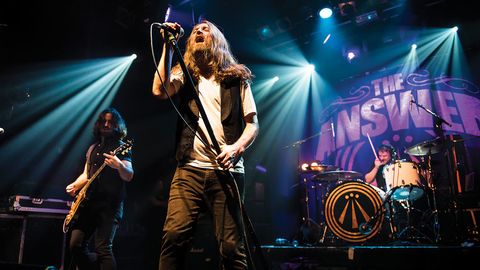It probably seemed like a great idea when it first occurred to their respective booking agents: a joint tour by The Answer and the Dead Daisies. Two purveyors of good-time raunch’n’roll on the same bill – what’s not to like?
The problem is that with their latest album, Solas, The Answer have undergone something of a transformation. Instead of no-frills boogie, there’s a more mature, adventurous sound that in places posits them as a blues-rock band with one ear attuned to the textural richness and sonic abandon of Radiohead, and another to Neil Young in mad, grizzled mode. Whereas the Dead Daisies – perhaps not unexpectedly, given their former employ as sidemen for, variously, Whitesnake, Mötley Crüe, Thin Lizzy, Billy Idol and Ozzy Osbourne – appear not to have got the memo. On their latest record, Make Some Noise, they’re still, albeit thrillingly in parts, in thrall to hard rock at its most bombastically effective and anthemically simple.
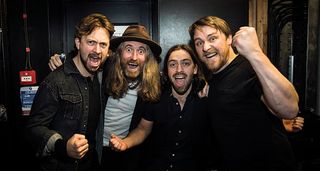
One of the immediate corollaries of this apparent bisection in terms of intention and ambition is that The Answer got a rave review for Solas in the December 2016 issue of Classic Rock while, in the August 2016 one, the Dead Daisies, um, didn’t.
“The Dead Daisies never manage to get away from the implication that they’re recreating what others did so well three decades ago,” Malcolm Dome wrote of Make Some Noise. Which is a fair enough opinion to hold. Trouble is, the band read it, and as a result they initially refuse to join yours truly upstairs at the Electric Ballroom for an interview.
However, following award-winning levels of diplomacy on the part of their PR, who manages to talk them down from their particularly high horse, they finally agree to a pre-gig summit. Guitarist David Lowy – the heir to a shopping empire, apparently – declines to be involved and so can’t answer the question about the Dead Daisies being a rich man’s plaything, but at least bassist Marco Mendoza and singer John Corabi are in a forgiving, humorous mood. “Aw, I thought this was for Penthouse,” a mock-disappointed Mendoza moans, breaking the ice.
Once the laughter subsides, Corabi, a riot of hair, tattoos and bangles, smarts at the negative review. “I’m not saying this to be sarcastic or mean: I personally don’t give a shit. To each his own. It’s one person’s opinion out of nine billion people on the planet.”
Besides, notes Mendoza, they’re about pleasing the fans, not critics. “We do a signing after each show and the queues have been out of control,” he says. “We have to cut them off, otherwise we’d be there for hours.”
Corabi, dragging on an e-cigarette, takes the long view. Aged 57, he remembers when – in real time – the likes of Led Zeppelin and Grand Funk Railroad would get slated in the press.
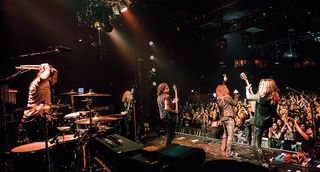
“Journey were never a critics’ band,” he argues of the Dead Daisies’ mooted lack of fashionability. “They panned the shit out of them. So it doesn’t matter.”
For Mendoza, a glass-half-full kind of guy, a harsh critique might offer “the incentive to work harder”. Corabi baulks at this notion. “That’s when you start catering and second-guessing,” he argues. Then he has a thought: “Name an artist now that’s one hundred per cent original. There’s not any.
“I’m not gonna lie,” he adds, “there’s a couple of songs on the record that sound a bit AC/DC-ish, there’s a couple that sound a bit Aerosmith-y, the title track has elements of Queen’s We Will Rock You. But that’s what we grew up listening to. That’s what we have to draw from.”
Is it the difference between trailblazing and carrying a torch? He ponders for a moment. “Trailblazing? I don’t know if that’s in music any more. I don’t even know if that word is relevant. You can’t reinvent the wheel.”
With Solas, The Answer haven’t reinvented the wheel, but they’ve dramatically reshaped the one propelling them on their peculiar trajectory. But it came at a cost. In 2015 they nearly broke up, having spent a decade and a half seemingly exhausting all the musical possibilities. Despite plenty of plaudits (from Jimmy Page and Robert Plant, among others), as well as 100,000 paying punters for their 2006 debut Rise, they have nothing to show for it in the bank.
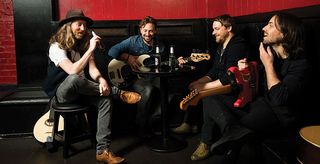
In a strange way, it was the terrible illness endured by frontman Cormac Neeson’s baby son, and his subsequent recovery, that afforded the singer the requisite fearlessness to encourage his band to make the necessary quantum leap into the experimental unknown. The last time this writer saw them live, at the Borderline in London in August 2015, the atmosphere was rapturous, even if, following a US tour alternating headline shows with support slots with Whitesnake, they were skint.
“That very night was probably the end of one chapter,” Neeson says of that fateful London gig. That [US] tour was very successful, and we had a great time, but we came back to be told there was no money in the kitty.”
Have they not heard of online banking? Sitting in the half-light of the dim bar area, the band – Neeson with his long hair and stetson, Paul Mahon with his guitar across his lap, Micky Waters cradling his bass, and drummer James Heatley – all laugh, but really it’s no laughing matter.
We had to have a serious conversation about the future of the band at that point,” continues Neeson. “We had to decide whether we were committed to trying to bring The Answer forward, or whether we’d run out of ideas and fallen out of love with the whole thing.
“We really didn’t have a Plan B,” he recalls. “The only way we were going to make it work was by making a record that was a massive leap to the left. But that was brilliant cos I was looking at life in a different way. I had all this pent-up emotion, both good and bad. The record isn’t all about being trapped in the darkness, there’s a joy to it too. The point is, I felt I had something new to say, that I had to say. And Solas was the perfect way to do that.”
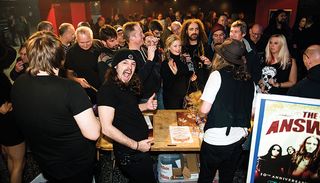
Were they worried that some long-term fans might be aggrieved? “We speak to a couple of hundred people every night after our shows, and yes I was worried about abuse,” Waters admits. “But not one person has told me they don’t like it.”
“Our fans get it,” Neeson says. “They love it. We’ve got a lot of hard-core, dedicated fans who are so overjoyed with our new direction. They tell us: ‘You’re brave, but it was the right thing to do.’ One guy came up to me and said he fucking loved the joy this record has brought to the band.”
The Answer are one of those outfits who generate fan fervour, but it works both ways. “You get the odd drunken, long-haired dude after gigs, saying: ‘Why did you not play anything off Rise?’” says Neeson.
They even had a stalker once, in Turkey, who attempted to get backstage following their stadium date in Belgrade supporting the Rolling Stones. He had a gun; he was angry at their “selling out” of the principles laid out in their early manifesto. Classic Rock expresses surprise, as do the band – they didn’t have an early manifesto.
The only thing on The Answer’s agenda these days is a commitment to challenge and change. “It’s challenging being on a tour like this where half the audience are there to see the other band and the other half are there to listen to the sound of progress,” Neeson says pointedly. Then, realising he’s perhaps being indiscreet – the two bands have been good friends for years – he professes to delighting in the opposite approaches of The Answer and the Dead Daisies.
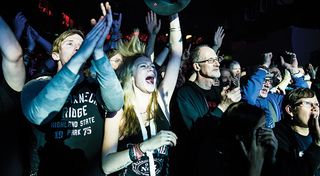
“This [joint tour] is fantastic for any self-respecting rock’n’roll fan, cos they get to see where the music is at in all its glory right now,” he declares. “It’s a massive cross-section, from one extreme to the other. I’d love to be there in the audience tonight.”
Actually, there is a third dimension to the show, provided by soul-blues doyenne Lynne Jackaman, formerly the singer with St Jude, who prefaces the two headliners with an admirable unplugged performance, with just a guitarist and her giant voice – think Robert Plant in the body of Lynsey de Paul – between her and oblivion.
- Burning cows, beef gyros and Buddy Holly: The Answer on tour
- The Answer - Solas album review
- The Answer on how new album Solas brought them back from the brink
- The Answer tease every track on new album Solas
“This next song is basically about an arsehole,” she says of No Halo during her own set, the voice of a debased angel via the language of the gutter. It’s strange but enlivening to hear a woman inverting, or subverting, blues braggadocio.
The Dead Daisies’ brand of strutting flamboyance doesn’t quite reach Steel Panther levels, but it’s difficult to tell the extent to which their tongues are in their cheeks. They arrive on stage to the strains of Led Zep’s Whole Lotta Love, flaunting their disregard for criticism of their excessive reverence towards rock’s illustrious past. In a venue like this, and given their powers of projection, it’s like seeing a huge 80s band warming up for a stadium tour, the players all long, crinkly blond locks, waistcoats, shirts open to the waist, and leather. They could all be minor members of Guns N’ Roses (indeed guitarist Richard Fortus has just left to join said renegades), except for Mendoza, who more closely resembles the love child of Gene Simmons and Lenny Kravitz.
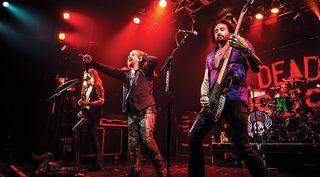
Make Some Noise is I Love Rock’N’Roll-meets-We Will Rock You with a dose of Kiss’s Crazy Nights. They’re too inch-perfect not to be a homage, if not an outright pastiche. There’s a fine line between paying tribute and being a tribute band, and the Dead Daisies teeter precariously on it. They’re like a walking, talking, condensed version of 70s and 80s hard rock. They shred, they boogie, and the audience devours every “Ow!” and squeal.
The Answer are going to need to go some to top that little lot. As soon as they launch into Solas – and tonight they play nine tracks from that album – the difference in tone from the Dead Daisies’ set is dramatic: from unreconstructed rockers, to a band who embody the idea of reconstruction.
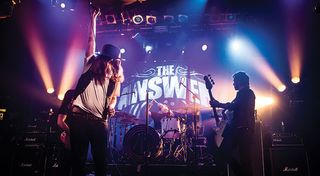
Beautiful World, tinged with Middle Eastern sonics and with a wide-ranging dynamic, is more Muse than Black Crowes. Like the Dasies’ frontman, Neeson knows how to hit a high note, but where Corabi’s wail is priapic, Neeson’s is existential, born of pain. Mahon puts his foot on the monitor – old habits die hard – and it’s half ironic gesture, half ancient pleasure.
For Demon Driven Man, Heatley wears headphones; the test here is to recreate the more complex studio material from Solas on stage. Tunnel has the slow-burning intensity of Rust Never Sleeps-era Neil Young. Mahon solos – fast (he can do Eddie Van Halen-style warp-speed if he wants to) – but it’s less electrifying, more elegiacal. For Nowhere Freeway, Jackaman joins Neeson and it’s like Meat Loaf duetting with Ellen Foley, only minus the melodrama and heft.
Waters gets funkily creative for Demon Eyes, Spectacular is four minutes of throbbing self-affirmation, and Battle Cry is exultant: ‘I can’t contain
this feeling,’ roars Neeson.
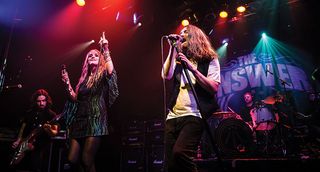
The audience is similarly overwhelmed as he jumps off stage, leaving the other three to finish the song on their own. Loads of them follow him to the bar, swarming and swamping him as he endeavours to greet them all and sign bits of clothing and even bits of flesh (not all female).
Backstage, Heatley is sweaty yet elated. “It feels like the early days again,” the drummer says, beaming. “We’ve got that freshness and excitement back.”
Mahon – whose birthday was yesterday, and for the occasion is given a bespoke Kit Kat/The Answer chocolate bar by a Japanese girl from Osaka – is just pleased they stuck at it. When they first emerged out of Belfast circa 2000⁄01, any discerning young guitar band wanted to be The Strokes. Not The Answer – they wanted to be Lynyrd Skynyrd. Now you can’t move for southern-fried wannabes, and The Answer are, once more, elsewhere.
“I guess we just needed something more from what we do,” says Neeson, removing his soaking-wet T-shirt. “This extra challenge has brought a great nervous energy to the band. It feels like our first tour.”
He sinks deep into a couch, can of beer in hand, and smiles. “We got into this band with open minds with regard to our direction and the songs we’d write,” he muses. “Somewhere along the line it got narrowed, and now it’s been blown wide open.”
Better still, the spark between them – personal as well as creative – is back.
“The bond we have right now is stronger than ever,” he says. “It felt like we were staring down the barrel of a gun, but we overcame these issues together by making music. But it didn’t come easily. We used to high-five each other after each gig, now we hug each other. It’s a small detail but it’s important. I’m comfortable in my own skin right now. We all are.”
The Dead Daisies - Make Some Noise album review
Listen to The Answer save their career on darkly epic new song Solas
